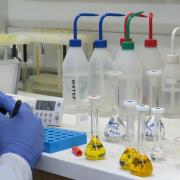Singalovski, Ort Junior high joint research:
This unique collaboration between the WRC-TAU, the Raymond and Beverly Sackler Faculty of Exact Sciences and the Ort Singalovski Junior High School in Tel Aviv intends to expose pupils to academic research. The topics investigated by the young researchers dealt with the following three aspects of water quality:
- Toxic metals in drinking water.
- Major ions profile of desalinated drinking water.
- Effects of constructed wetland on metals in Yarkon River.
Thereby they learn how to sample water, design a study, analyze data results and draw scientific conclusions. In addition, they participate in laboratory activities on campus, attend lectures given by TAU professors and take a challenging field trip led by the staff of WRC-TAU.
Kishon river authority – micro pollutants survey:
This survey was done to investigate the presence of several endocrine disrupters' chemicals (EDCs) downstream the Kishon River. EDCs like Bisphenol A and Estradiols are considered with high potential for negative effects on aquatic biota, even at very low concentrations. The Kishon River is known as high polluted area, mainly from heavy industries of chemicals and petrochemicals. The hydrochemistry laboratory chemists developed an analytical method to detect 5 EDCs at trace level in Kishon water. The method included solid phase extraction procedure for sample preparation and HPLC/MS method for detection and quantification.
Click for the full survey at Kishon river authority website (Hebrew)
CONAGUA:
A research collaboration project with the water resources management in Mexico, named CONAGUA, established in 2015. The research topics dealt with aspects of industrial and domestic wastewater treatment, groundwater quality & recharge and drinking water quality & treatment. Under this collaboration, focusing on specific water problems in Mexico, the following subjects studied:
- Peroxide addition to secondary effluent as an oxygen source for bacterial soil activity.
- Reduction of manganese dissolution in reclaimed water and elimination of trace organic compounds in wastewater effluent via a multi-stage ozonation pilot followed by soil aquifer treatment (SAT).
- Evaluating groundwater flow beneath artificial recharge ponds using Sulfur Hexafluoride.
- Use of constructed wetland technology for removal of estrogenic contaminants from municipal effluents.
- Treatment of hospital wastewater using hybrid MBR-modified AOP technology: Pilot study.
- Treating wastewater from a pharmaceutical formulating facility, by innovative AOP processes.
- Treatment of industrial wastewater.
- Oil Shale - Water Consumption and Pollution.
- Control of microbial deposition in water distribution systems and reverse osmosis membranes: Pilot study.
- Solar enhanced treatments for water disinfection.
- Sustainable water technologies, management, and processes for the urban environment.




